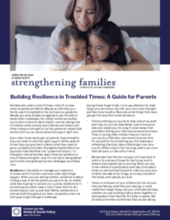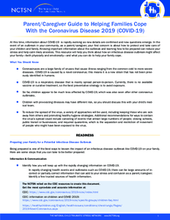This section includes resources for promoting nurturing care and positive development for children during the COVID-19 pandemic. Resources include those that offer guidance for parents and caregivers who are caring for children during lockdowns and quarantines who do not have access to schools and other services.
Displaying 101 - 110 of 128
This webpage from the Center on the Developing Child at Harvard University lists some simple, free activities to help support a child’s healthy development during the COVID-19 crisis.
This Practitioner Guidance Paper shares the different approaches taken by three Family for Every Child Members to mitigate this disruption: moving to online learning for unaccompanied minors with METAdrasi in Greece; using the radio to provide far-reaching lessons with FOST in Zimbabwe; and engaging parents in their children's education using a socially-distanced homework collection system with CAP Liberia.
In an effort to provide the community with helpful resources during the coronavirus pandemic, WQED has put together a collection of resources.
This webpage from ZERO TO THREE features resources offering tips for families including age-appropriate responses to common questions, a guide to self-care, and activities for young children experiencing social distancing.
On this webpage, UNICEF answers some common questions that parents may have about the novel coronavirus, including how to talk about the coronavirus with children.
This page from the UNICEF website features the latest updates, explainers for parents and teachers, and resources for media related to COVID-19.
These additional considerations are intended to provide guidance for a range of child care programs that remain open, and should be used in conjunction with CDC’s guidance for administrators of child care programs and K-12 schools.
This brochure from the Center for the Study of Social Policy's Strengthening Families initiative shares tips for parents to draw on their own strengths and build a network of support to better help their children to thrive during challenging times, such as the COVID-19 pandemic.
This webpage presents a selection of tools, articles and other resources being shared across the community of children’s rights practitioners concerning the current coronavirus pandemic.
This resource from the U.S. National Child Traumatic Stress Network will help you think about how an infectious disease outbreak might affect your family—both physically and emotionally—and what you can do to help your family cope.


